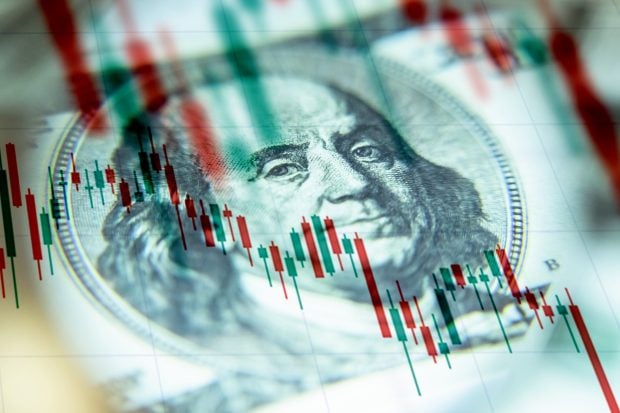After reporting growing anxiety during the year before theNovember presidential election, the latest Marketplace-EdisonResearch Poll showed that the Economic Anxiety Index has decreased,from 36 in October to 32.
|The poll found that Americans had an overall improved feeling offinancial security. They were less worried about losing their jobs,ability to pay their mortgage or rent and saving for retirementthan they were six months ago.
|Still, other research shows that less than half ofAmericans are confident they will achieve their retirementgoals.
|The EconomicAnxiety Index, a number on a scale from 0 to 100 that iscalculated from answers to survey responses, describes just howstressed out people feel about their personal financial situation.The higher the number, the more economic stress someone isfeeling.
|The national survey involved 1,044 Americans ages 18 and older,500 of whom were interviewed by telephone in early April and 544 ofwhom were interviewed online.
|Reduced economic anxiety notwithstanding, 82% of respondentssaid they worried about health care “a lot” or “a little.” It wasthe top economic concern across the political spectrum, though moreso for Democrats that for Republicans: 38% vs. 22%.
|Three-quarters of respondents expressed fear about being unableto afford health care services they or their family need.
|In the meantime, the Trump administration and GOP lawmakersare at odds over a renewed effort to revise theAffordable Care Act.
|One expert recently described threeproblems successful health care reform must solve.
|Nearly three-quarters of surveyed respondents said they felt thegovernment in Washington has forgotten them, a sentiment that cutacross party lines.
|The survey found that the number of Americans who completelydistrust economic data reported by the federal government, such asthe unemployment rate, had declined from 25% to 18% — largelydriven by an increase in trust among Republicans.
|First 100 Days
|Forty-three percent of respondents approved of theadministration's handling of the U.S. economy. This compared with a52% approval rating for the Obama administration in October.
|Half thought the U.S. government should be run more like abusiness, including 78% of Republicans but only 32% ofDemocrats.
|Although the White House has not pursued a major infrastructureimprovement bill, 85% of both Republicans and Democrats would likeCongress to pass such a bill, according to the survey.
|In addition, a strong majority of respondents supported the ideaof raising taxes on businesses that move manufacturing jobsoverseas, with 74% of Republicans in favor versus 69% ofDemocrats.
||The White House is expected to release a tax plan forindividuals and businesses this week. Treasury Secretary StevenMnuchin recently asserted that a tax code overhaul would takeplace by year-end.
|Half of respondents in the survey favored the administration'sproposal to significantly increase defense spending, though only35% of Democrats supported it, compared with 72% ofRepublicans.
|On the fraught subject of immigration, 57% of respondents saidbuilding a wall between the U.S. and Mexico would hurt the U.S.economy.
|In addition, 60% said expanding the number of visas forshort-term or skilled workers would help the economy. Sixty-fivepercent of Democrats and 53% of Republicans said this policy wouldhelp.
|However, these numbers varied by education, as 70% of those witha college or postgraduate degree thought it would help, comparedwith 52% of those with a high school education or less.
|Asked to choose between these two statements — “Immigrants takejobs away from American workers” or “Immigrants do the jobsAmericans don't want to do” — 60% of respondents agreed with thesecond statement.
Complete your profile to continue reading and get FREE access to CUTimes.com, part of your ALM digital membership.
Your access to unlimited CUTimes.com content isn’t changing.
Once you are an ALM digital member, you’ll receive:
- Critical CUTimes.com information including comprehensive product and service provider listings via the Marketplace Directory, CU Careers, resources from industry leaders, webcasts, and breaking news, analysis and more with our informative Newsletters.
- Exclusive discounts on ALM and CU Times events.
- Access to other award-winning ALM websites including Law.com and GlobeSt.com.
Already have an account? Sign In
© 2024 ALM Global, LLC, All Rights Reserved. Request academic re-use from www.copyright.com. All other uses, submit a request to [email protected]. For more information visit Asset & Logo Licensing.









